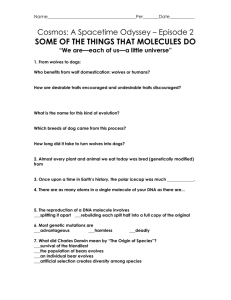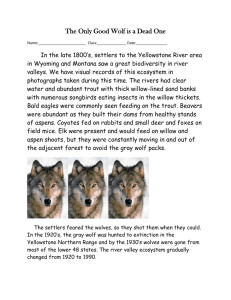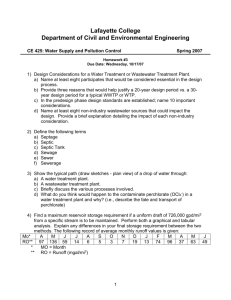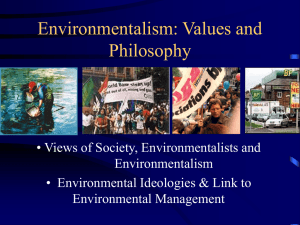introduction to environmental ethics06
advertisement
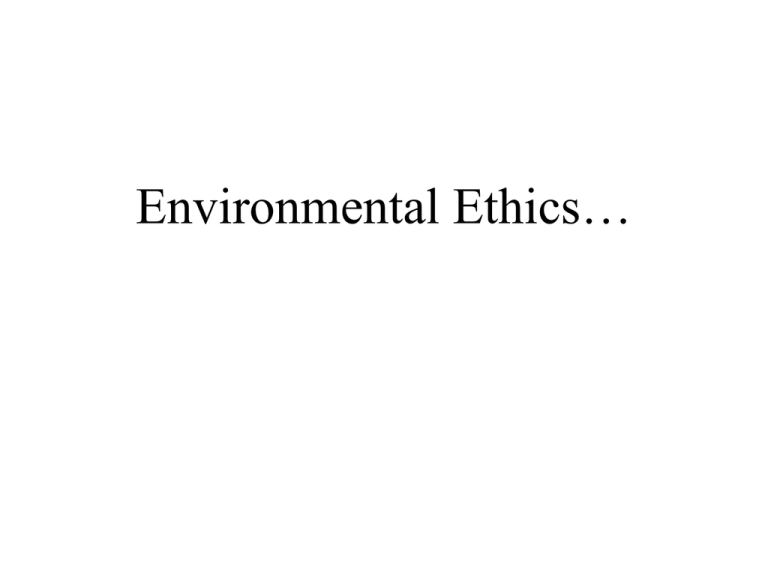
Environmental Ethics… Learning outcomes •Be aware that environmentalism is an umbrella term. •Know the historical context of this debate (enlightenment). •Be familiar with of technocentrism and ecocentrism •Be familiar with: the land ethic; utilitarian environmental ethics; instrumental environmental ethics. What is environmentalism? •A specialist in the maintenance of ecological balance and the conservation of the environment • Collins Concise English Dictionary Definition •The ‘green’ ideas about the relationship between society and nature – David Pepper, 1996 Given this vagueness, we need to know a bit about this term to understand our role as managers, sustainability experts and scientists The Big Picture I: The Renaissance The Big Picture II: The Industrial Revolution The Big Picture III: The Enlightenment Cognito, ergo sum! The Modern Age! • The humans are the centre of the universe, not god. • That reason, the power of the intellect is far more important than faith, dogma or tradition. • That we can understand things, and make them more efficient, by dividing them up into lots of little parts. This is called reductionism. • Technology, technology, technology. The Root of Environmental Problems • (broad statement): ecosystems don’t work by dividing up things into parts that specialize on specific tasks. City versus Country We were eating lunch on a high rimrock, at the foot of which a turbulent river elbowed its way. We saw what we thought was a doe fording the torrent, her breast awash in white water. When she climbed the bank toward us and shook out her tail, we realized our error: it was a wolf. A half-dozen others, evidently grown pups, sprang from the willows and all joined in a welcoming melee of wagging tails and playful maulings. What was literally a pile of wolves writhed and tumbled in the center of an open flat at the foot of our rimrock. http://7art-screensavers.com/screenshots/Angry_Wolves/2-screeming-wolves.jpg In those days we had never heard of passing up a chance to kill a wolf. In a second we were pumping lead into the pack, but with more excitement than accuracy; how to aim a steep downhill shot is always confusing. When our rifles were empty, the old wolf was down, and a pup was dragging a leg into impassable siderocks. http://7art-screensavers.com/screenshots/Angry_Wolves/2-screeming-wolves.jpg We reached the old wolf in time to watch a fierce green fire dying in her eyes. I realized then, and have known ever since, that there was something new to me in those eyes—something known only to her and to the mountain. I was young then, and full of trigger-itch; I thought that because fewer wolves meant more deer, that no wolves would mean hunters' paradise. But after seeing the green fire die, I sensed that neither the wolf nor the mountain agreed with such a view. http://7art-screensavers.com/screenshots/Angry_Wolves/2-screeming-wolves.jpg Since then I have lived to see state after state extirpate its wolves. I have watched the face of many a newly wolfless mountain, and seen the south-facing slopes wrinkle with a maze of new deer trails. I have seen every edible bush and seedling browsed, first to anaemic desuetude, and then to death. I have seen every edible tree defoliated to the height of a saddlehorn. Such a mountain looks as if someone had given God a new pruning shears, and forbidden Him all other exercise. http://7art-screensavers.com/screenshots/Angry_Wolves/2-screeming-wolves.jpg In the end the starved bones of the hoped-for deer herd, dead of its own too-much, bleach with the bones of the dead sage, or molder under the highlined junipers. Leopold, Aldo. 1948, A Sand County Almanac. New York, Oxford University Press. 1987 Editino, pp. 129-132. http://7art-screensavers.com/screenshots/Angry_Wolves/2-screeming-wolves.jpg The Land Ethic (Leopold) A thing is right when it tends to preserve the integrity, stability, and beauty of the biotic community. It is wrong when it tends otherwise. Implications of the Land Ethic http://www.acoustic-dream.com/archives/2002_07.php Are we at the end of the enlightenment? Is it technology versus the environment? The polarized debate… Technocentrism Look at all the good stuff technology has given us! Eco-centrism Argh! Modern society has polluted the environment Ecocentrism • Ecocentrics, including "deep green" ecologists, see themselves as being subject to nature, rather than in control of it. They lack faith in modern technology and the bureaucracy attached to it. Ecocentrics will argue that the natural world should be respected for its processes and products, and that low impact technology and self-reliance is more desirable than technological control of nature. • http://www.doc.mmu.ac.uk/aric/esd/Earth/Ecocentrism_and_Technocentrism.html Techno-centrism • Technocentrics, … have … faith in technology and industry and firmly believe that humans have control over nature. Although technocentrics may accept that environmental problems do exist, they do not see them as problems to be solved by a reduction in industry. Rather, environmental problems are seen as problems to be solved using science [and technology]. Indeed, technocentrics see that the way forward for developed and developing countries and the solutions to our environmental problems today lie in scientific and technological advancement…. • http://www.doc.mmu.ac.uk/aric/esd/Earth/Ecocentrism_and_Technocentrism.html An ecocentric view of food Most of the people who are going to die in the greatest cataclysm in the history of man have already been born,“ (1969, Paul Ehrlich "EcoCatastrophe!" Ramparts.) Technocentric view of food. Most of the people who are going to die in the greatest cataclysm in the history of man have already been born,“ (1969, Paul Ehrlich "EcoCatastrophe!" Ramparts.) There is no physical … reason why human resourcefulness cannot forever continue to respond to impending shortages … Julian Simon, 1981, The Ultimate Resource) Evidence used by eco-centrism Evidence used by the techno-centric argument Utilitarianism • If a being suffers, them can be no moral justification for refusing to take that suffering into consideration. No matter what the nature of the being, the principle of equality requires that its suffering be counted equally with the like suffering -in so far as rough comparisons can be madeof any other being. See: Singer, Peter. (1973) Animal Liberation. New York Review of April edition. Pp. 17-21 Utility for whom? Instrumentalism • One of the central themes of environmental economics, and central to sustainable development thinking also, is the need to place proper values on the services provided by natural environments. The central problem is that many of these services are provided 'free'. Pearce, David W., Anil Markandya, and Edward B. Barbier. 1989 Blueprint for a green economy. London: Earthscan. Implications of Instrumentalism Price = cost of production + profit HOWEVER Some costs of production (especially environmental costs) don’t get included. This represents a market FAILURE and would be called a NEGATIVE EXTERNALITY Learning outcomes •Be aware that environmentalism is an umbrella term. •Know the historical context of this debate (enlightenment). •Be familiar with of technocentrism and ecocentrism •Be familiar with: the land ethic; utilitarian environmental ethics; instrumental environmental ethics.
